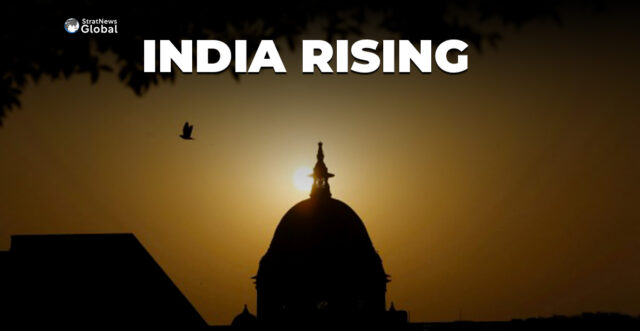India’s economy is anticipated to surpass Japan in gross domestic product (GDP) terms in the coming years, as Japan grapples with economic stagnation and a weakening yen.
Economists now believe that India, currently the fifth-largest economy, could overtake Japan to claim the fourth spot sooner than expected, according to The Japan Times.
Marcel Thieliant, head of Asia-Pacific at Capital Economics, told The Japan Times that initial forecasts had projected India would surpass Japan by 2026. However, recent economic changes have prompted a reassessment of that timeline.
Various forecasts suggest different timelines, with the International Monetary Fund (IMF) predicting that the Indian economy could overtake Japan as early as 2025, while S&P Global Ratings foresees the shift happening by 2030.
Japan, once the world’s second-largest economy, lost its position to China in 2010. Earlier this year, Germany also surpassed Japan, placing Japan fourth in the global rankings. According to The Japan Times, India’s growing population and economic expansion make this shift nearly inevitable.
In 2023, the World Bank estimated India’s GDP at $3.55 trillion, compared with Japan’s $4.22 trillion. The IMF projects India’s economy will grow by 7% in 2024 and 6.5% in 2025, while Japan’s growth is expected to remain low at 0.3% this year and 1.1% in 2025.
Japan has struggled with economic stagnation, experiencing deflation and recurring recessions, whereas the Indian economy has shown steady growth, particularly since 2000.
“There is no obvious reason why India should not be able to grow by 6% to 7% per year, in real term,” The Japan Times quoted Louis Kuijs, chief economist for Asia-Pacific at S&P Global Ratings, as saying. Should these growth rates hold, India could soon surpass Japan’s GDP and even challenge Germany for the third position globally, behind only the United States and China.
When measured by purchasing power parity (PPP), which accounts for price differences between countries, India already ranks as the third-largest economy, while Japan is fifth. Still, The Japan Times cautioned that these forecasts should be viewed with care, as economic policies could shift due to recent political changes in Japan, where a minority government and conservative central bank may affect growth and currency stability.
The Japan Times also reported that recent political changes in the United States, particularly the election of Donald Trump, could alter trade flows and economic dynamics for both Japan and India.
The report quoted Thieliant as saying that his team at Capital Economics is reviewing its projections to account for the potential impacts of Trump’s victory on trade, which may affect the timing of India’s anticipated rise.
Economists advise keeping perspective on India’s growth. The Japan Times pointed out that with a GDP per capita of about $2,500 compared to Japan’s $34,000, India’s economic ascent does not yet translate to a comparable standard of living.
While promising, India’s rise does faces challenges. Shilan Shah, deputy chief emerging markets economist at Capital Economics, told The Japan Times that “domestic issues such as weaknesses in the banking sector or inflation from rising food prices” could potentially delay India’s progress.
In a career spanning three decades and counting, Ramananda (Ram to his friends) has been the foreign editor of The Telegraph, Outlook Magazine and the New Indian Express. He helped set up rediff.com’s editorial operations in San Jose and New York, helmed sify.com, and was the founder editor of India.com.
His work has featured in national and international publications like the Al Jazeera Centre for Studies, Global Times and Ashahi Shimbun. But his one constant over all these years, he says, has been the attempt to understand rising India’s place in the world.
He can rustle up a mean salad, his oil-less pepper chicken is to die for, and all it takes is some beer and rhythm and blues to rock his soul.
Talk to him about foreign and strategic affairs, media, South Asia, China, and of course India.





